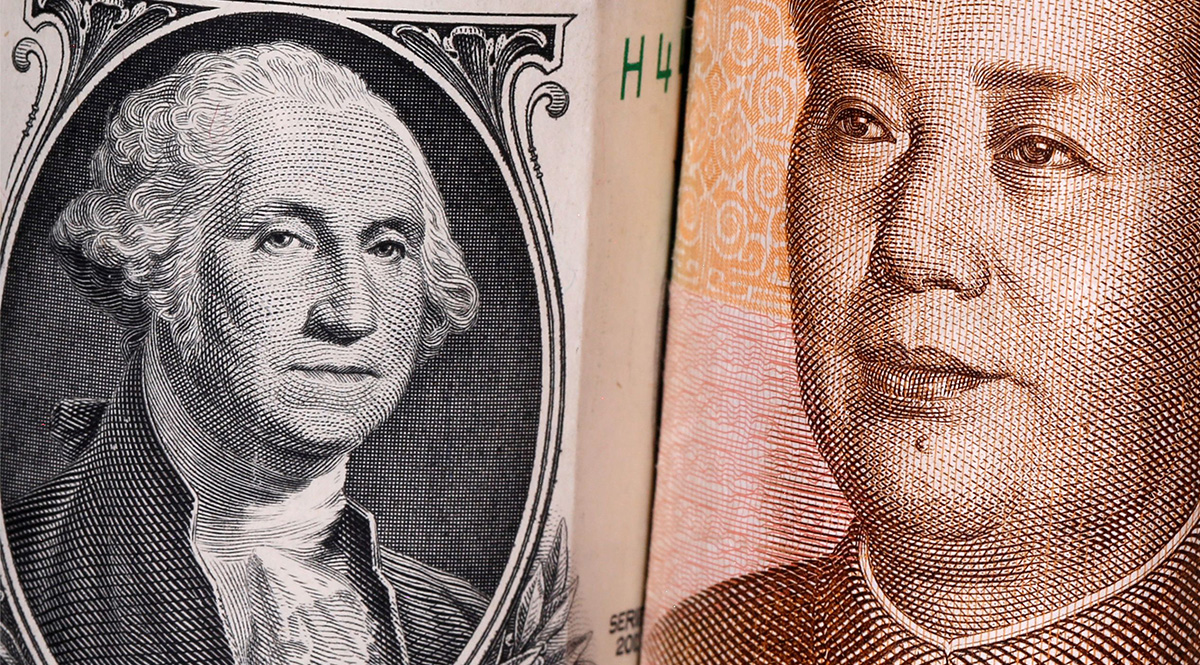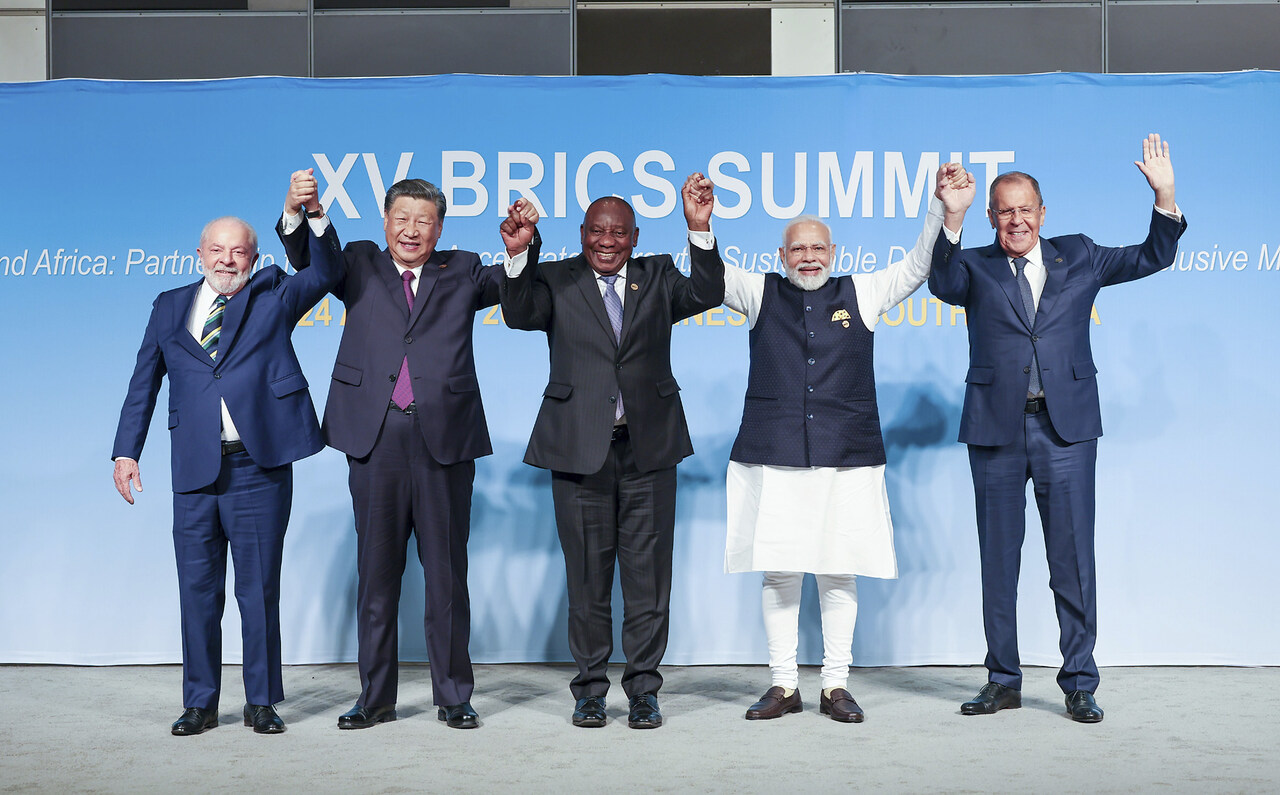Alternatives to the U.S. Dollar as a Global Currency Face Brick Walls
In the wake of a series of economic and political crises, including developing countries’ external debt crisis and Russian aggression against Ukraine and related sanctions, there has been speculation about the possible replacement of the U.S. dollar (USD) in the global economy. This could take place through the emergence of a new global currency or a shift to settlements in the currencies of the transacting parties. Either of these solutions involves political and economic difficulties and is not currently realistic. It is advisable that Poland, in its foreign policy, assumes the continuation of the dominance of USD in the global economy.
 Dado Ruvic / Reuters / Forum
Dado Ruvic / Reuters / Forum
New Global Currency
The first candidate to replace the dollar is the Chinese renminbi (RMB; alternatively referred to as the yuan). It is backed by the world’s second-largest economy, which entails access to large foreign exchange and financial markets. The potential of the RMB also stems from political issues: China is the main rival of the U.S. and seeks to position itself as a representative of developing countries, whose role as a group in the global economy is growing, by intensively expanding relations with them, including through the BRICS+ or Belt and Road Initiative (BRI). China would also likely be able to ensure the development of financial infrastructure to settle RMB transactions.
Despite these strengths, the takeover of the dollar’s global role by the renminbi faces serious difficulties. Central to this are China’s weak property rights and the large role of the authoritarian state in the economy (including financial markets), which reduces market participants’ confidence in the currency, especially as a savings vehicle. This effect is compounded by political control over the renminbi exchange rate and interventions by the central bank and state-owned banks in the foreign exchange market. This is related to the fact that China’s economic policy is based on exports and trade surpluses, and monetary policy is subordinate to these objectives. China also has a policy of capital controls (certain types of flows are prohibited or require authorisation) and foreign investment controls. These substantially increase difficulties associated with investing renminbi or repatriating profits. Changes to these policies would entail a willingness to accept trade deficits, a shift to an economic model based more heavily on traditionally low consumption (potentially including imported products) and an increase in the value of RMB, which would be detrimental to Chinese industry. Improving property protection and the quality of institutions, meanwhile, would threaten the Chinese Communist Party’s political monopoly. It could also remain a problem for partners that China would find itself in a position to exploit the RMB no less than the U.S. currently exploits the dollar, for example, by imposing sanctions for political gains. Furthermore, while the Chinese economy has developed incredibly fast in recent decades, it is now facing structural problems and its growth is likely to slow down. A solution to these difficulties facing the RMB is unlikely, as it would require changes to the Chinese economic and political model (in both domestic and foreign policy). Without such action, the promotion of the renminbi as a new global currency, or at least its widespread use by third countries, will remain a political project carried out against economic realities. It would at best have a chance for limited success, for example, by increasing the use of RMB in foreign trade (without completely replacing the currencies of Western countries) by countries that find the project politically beneficial.
Last summer, after the BRICS summit in South Africa, discussions about the introduction of a “BRICS currency” also emerged. Beyond general political declarations, however, there are no details of how it would work. Due to the heterogeneity of the group (importers and exporters of energy, trade surpluses and deficits countries, industrial and raw material economies, located on four continents, with different political and economic relations with the West), its members will have different interests. It would therefore be very difficult to establish a common monetary policy. Given the realities of the BRICS+ members’ domestic politics and the tensions between them (e.g., China and India), it is unlikely that they would agree to limit their sovereignty in favour of sharing it with other countries of the bloc. It is feasible to create clearing mechanisms that would not, however, be a stand-alone currency, although it might happen that BRICS+ members will present them in this way so as to create a message about the success of the format. These could be settlement units, based on baskets of group members’ currencies, convertible into them and traded on financial markets. Their use in trade between group members and even, to a limited extent, with other partners cannot be ruled out. However, they will not replace the dollar as a reserve currency—they will be exchanged for traditional reserve currencies at some point, and their success will depend on the ability of this conversion.
Settlements in the Currencies of the Transacting Parties
Countries potentially interested in reducing the role of the dollar in their foreign trade may also try to switch to settlements in national currencies not used by third countries. However, this will raise a number of difficulties. A key problem will be the low liquidity of non-U.S. dollar currency pairs. Currently, exchanging one national currency for another very often involves two transactions—exchanging the first currency for the USD (vehicle currency) and then the USD for the target currency. This means that attempts to abandon the USD in international trade by, for example, invoicing in local currencies, will not allow it (or another vehicle currency) to be bypassed in the exchange without slowing down trade and increasing transaction costs. Furthermore, even if national currencies were used in trade, they—like the RMB—would not be attractive as reserve currencies for government or as a means of accumulating savings for businesses and consumers. It would therefore be necessary to balance trade between partners, exchange surpluses into convertible currencies to hold as reserves or accepting unrestricted exchange, but this would have far-reaching consequences for exchange rates. Such measures would be suboptimal from the economic point of view—increasing the role of the currencies of the transacting parties can therefore only occur as a settlement tool (and not as a means of accumulating savings or determining the real value of goods) and only if appropriate political decisions are taken.
Conclusions
The dollar will maintain its dominant position in the global economy in the foreseeable future, not only because of its strength but also because of the weakness of the alternatives. Possible shifts would mainly benefit currencies of countries favouring the U.S. (e.g., the euro, the Japanese yen, or the British pound) with characteristics similar to the USD, and cause only limited political consequences. A fundamental change could only result from a series of highly improbable political decisions by the U.S. aiming to willingly abandon the dominance of its currency in the global. At present, there is no currency of a country that is not part of or an ally of the West that meets the conditions necessary to take on the role that the USD performs. The RMB will not become a global currency without profound changes to China's economy and political and legal system, which are currently unlikely to happen. Greater international use of the RMB is possible, but this will be driven by political factors, such as the lack of confidence of some countries in the USD or the inability to use the dollar freely, for example, due to sanctions imposed.
The creation of a “BRICS+ currency” also remains impossible. Possible changes in trade between BRICS+ members could move towards mutual settlement in national currencies or attempts to create new multilateral settlement mechanisms. Members of the group could promote their use by third countries as well. At present, however, there is no information about progress in this area, so the possible declarations have mainly rhetorical significance and should be seen as an expression of disagreement with Western policies (also in terms of using economic tools, including the dollar, to achieve political goals) rather than harbingers of an imminent change in the global economy.
The supposed imminent collapse of the West, including the USD, and its potential replacement by China and the renminbi, sometimes discussed in media, are not realistic and should not be the basis for Poland’s foreign policy. Also, in relations with developing countries, there is no reason for changing settlement currencies. To do so would be economically unviable, premature (due to the continued dominance of the USD), and would undermine Western unity.





